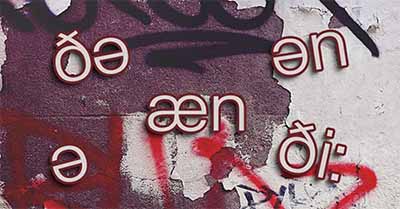Pronunciation of Definite and Indefinite Articles in English
Email this page
The pronunciation of the articles English is different depending on where they appear in the sentence and how you emphasize them. The differences are small, but speakers of English know the differences naturally.
In this lesson, you will learn each situation where you pronounce the definite ( “the”) and indefinite articles ( “a” and “an”) differently.

Suzy Hazelwood | Pexels
Pronunciation Rules for the Definite Article “the”
The pronunciation of the definite article “the” changes depending on how you use it and on the word that follows it.
Pronunciation of “the”
”The” by itself
If you say “the” by itself, it is pronounced as the EE in “see” /ðij/.
Notice the /j/ sound at the end. It has the Y-sound. It makes the /i/ in “the” long.
”The” before a consonant sound
If “the” comes before a word that starts with a consonant, it is not stressed, so you pronounce it /ðə/.
For example, you say
the lesson → /ðəˈlɛsən/
the woman → /ðəˈwʊmən/
the school → /ðəˈskul/
”The” before a vowel
Pronounce “the” /ðij/ before vowel sounds.
In connected speech, you can hear the /j/ (the Y-sound) very well because it connects to the vowel in the next word.
For example, you say
the apple → /ðiˈjæpəl/
the actor → /ðiˈjæktɚ/
the hour → /ðiˈjawɚ/
Stressing ”the” for emphasis
If you emphasize the word “the,” it is pronounced /ðij/. It does not matter if it comes before a consonant or a vowel.
Let’s see more examples of “the” in different situations.
More examples of “the”
1. “The” /ðə/ followed by consonant sounds
- the cake → /ðəˈkeɪk/
- the fork → /ðəˈfɔrk/
- the woman → /ðəˈwʊmən/
- the lesson → /ðəˈlɛsən/
- the university → /ðəˈjuːnəˈvɚsəti/
Note. The letter “U” is a vowel in spelling but, in the “university,” it is has a consonant in pronunciation. /ju/ has a “Y” sound, which is a consonant.
2. “The” /ðij/ followed by vowel sounds
- the apple cake → /ðiˈjæpəl keɪk/
- the → orange → /ðiˈjɔrɪnʤ/
- the ugly dog → /ðiˈjʌgli ˈdɑːg/
- the Earth → /ðiˈjɚθ/
- the hour → /ðiˈjawɚ/
- the honest man → /ðiˈjɑnɪst ˈmæn/
Note. The letter “H” is a consonant but, in pronunciation, the words “hour” and “honest” start with a vowel sounds because the Hs are not pronounced.
3. Stressing “the” /ðij/ for emphasis
- He is not just a good teacher. He is the teacher everyone needs to have. (Pronounced /ˈðiː ˈtitʃɚ/ to emphasize that he is a great teacher.)
- There are many ways to do this. I’ll teach you the way to do it. (Pronounced /ˈðiː ˈweɪ/ to emphasize that it is the best way.)
Video Activity 1 (”the”)
Video will be available soon.
Pronunciation Rules for the Indefinite Articles “a” or “an”
Think of the indefinite article as just the word “a,” but you add an N-sound when the word after it starts with a vowel sound. That sound is also in writing, so “a” becomes “an”.
Pronunciation of “A” and “An”
”A” and “An" by themselves
If you say “a” by itself, it is pronounced as the EY in “Hey!” /eɪ/.
If you say “an” by itself, it is pronounced as the name “Ann” /æn/.
”A” before a consonant sound.
If “a” comes before a word that starts with a consonant, it is not stressed, so you pronounce with the schwa sound /ə/.
For example, you say
a lesson → /əˈlɛsən/
a woman → /əˈwʊmən/
a house → /əˈhaʊs/
“An” before a vowel sound.
Use “an” before vowel sounds. Then it is unstressed, and you pronounce it with the schwa sound /ən/.
For example, you say
an apple → /ənˈæp əl/
an elephant → /ənˈɛl ə fənt/
an old house → /ənˈold ˈhaʊs/
an hour → /ənˈaʊər/
Notes
The letter H is a consonant, but sometimes you do not pronounce it. That is why you say “a house” but “an hour”
The letter U is a vowel in spelling but, in words such as “university” or “universe,” it is has a consonant /ju/ in pronunciation. This /ju/ has a Y-sound, which is a consonant.
Pronunciation of the Indefinite Articles “A” and “An”
Think of the indefinite article as just the word “a,” but you add an N-sound when the word after it starts with a vowel sound. That sound is also in writing, so “a” becomes “an”.
Pronouncing “A”
- Pronounce “a” /ə/ in normal, connected speech.
- Pronounce “a” /ˈeɪ/ when you say the word by itself or when you want to emphasize it. Some people also pronounce it /ˈeɪ/ normally.
Pronouncing “AN”
- Pronounce “a” /ˈæn/ when you say the word by itself or when you want to emphasize it. Some people also pronounce it /'æn/ normally, especially if they are speaking slowly and carefully.
- Usually, you pronounce “an” /ən/ in normal, connected speech.
More examples of “a” and “an”
“A” followed by consonant sounds
- a cake → /əˈkeɪk/
- a fork → /əˈfɔrk/
- a woman → /əˈwʊmən/
- a lesson → /əˈlɛsən/
- a university → /əˈjuːnəˈvɚsəti/
Note. The letter “U” in “university” is a vowel in spelling, but it is as a consonant in pronunciation: /ju/ has a “Y” sound, which is a consonant.
“AN” followed by vowel sounds
- an apple cake → /ənˈæpəl keɪk/
- an orange → /ən'ɔrɪnʤ/
- an ugly dog → /ən'ʌgli dɑːg/
- an English movie → /ən'ɪŋglɪʃ 'mu:vi/
Video Activity 2 (”a”/”an”)
Video will be available soon.
Assess Your Learning
Practice 1. Practice the pronunciation of “the” and assess your understanding of this lesson.
Related Lesson
Pronunciation of “the” with hard attack (new tab). Many native speakers in the United States pronounce a consonant sound (a glottal stop) before “the,” so they very often pronounce “the” the same before vowels and consonants.
Congratulations on completing this lesson!

Thanks to our supporters!
This material has been made possible by supporters like you. Learn how you can support us.
Thank you for Supporting Snap Language
Snap Language supporters make the creation of these materials possible.
Learn how you can support our work, get perks, and help us continue creating high-quality materials.
You can support us by simply white-listing this site.